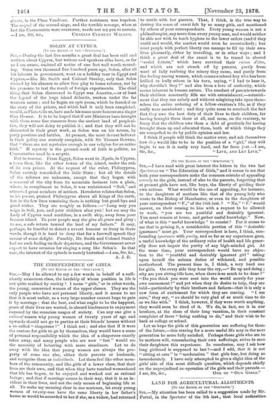THE INDEPENDENCE OF GIRLS.
[TO THE EDITOR OF THE " SPECTATOR.")
Sin,—May I be allowed to say a few words in behalf of a suffi- ciently numerous class, the hardship of whose position in life is not quite realised by society ? I mean " girls," or in other words, the young, unmarried women of the upper classes. They are the only people who have not personal liberty, and it seems to me that it is most unfair, as a very large number cannot hope to gain it by marriage ; that the best, and what ought to be the happiest, years of their lives are wasted, in absurd hindrances to enjoyment imposed by the senseless usages of society. Can any one give a rational reason why young women of twenty years of age and upwards should not go to parties at their friends' houses without a so-called " chaperone ?" I think not ; and also that if it were the custom for girls to go by themselves, they would have a sense of personal responsibility which the idea of a chaperone exactly takes away, and many people who are now " fast " would see the necessity of behaving with more steadiness. Let us do away with the idea that young women are always the pro- perty of some one else, either their parents or husbands, and recognise them as individuals. Let them feel like other mem- bers of the community, and like girls of a lower class, that their lives are their own, and that when they have reached womanhood that life has begun, to be enjoyed and worked out as rational beings ; and that if marriage comes in their way, that it is an in- cident in their lives, and not the only means of beginning life at all. To make my meaning clear in one sentence, let every young woman of twenty-one have the same liberty in her father's house as would be accorded to her if she, as a widow, had returned to reside with her parents. That, I think, is the true way to• destroy the sense of ennui felt by so many girls, and mentioned by others of your correspondents. Every young woman is not a philanthropist, any more than every young man, and would neither be able nor wish to teach hygiene to the lower orders (and if they could and would, the market would soon be overstocked); but most people with perfect liberty can manage to fill up their own lives pleasantly, either by travelling, or in other ways ; and I think a great deal of the ennui is to be traced to absurd' "social fetters," which have survived their raison d'être, and which are not struck off by parents, partly from want of fully realising the misery they cause, and partly from the feeling among women, which causes a school-boy who has beers bullied to bully others in his turn, saying, " I had to bear it, why shouldn't they ?" and also from a love of authority, which seems inherent in human nature. The conduct of parents towards their children constantly fills me with astonishment,—astonish- ment that they can calmly and without misgiving take upon them- selves the entire ordering of a fellow-creature's life, as if they- really were omniscient ; and they quite seem to overlook the fact that they owe the best duty of their lives to their children, for- having brought them there at all, and seem, on the contrary, to fancy that the children owe them a debt of gratitude for having brought them up and educated them, both of which things they are compelled to do by public opinion and law.
I think if people will think the matter over, and ask themselves how they would like to be in the position of a "girl," they will begin to see it is really very hard, and far from just.—I anr„


































 Previous page
Previous page